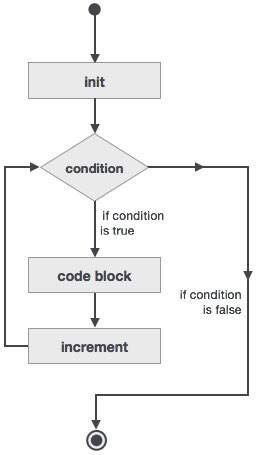
- Fortran - Home
- Fortran - Overview
- Fortran - Environment Setup
- Fortran - Basic Syntax
- Fortran - Data Types
- Fortran - Variables
- Fortran - Constants
- Fortran - Operators
- Fortran - Decisions
- Fortran - Loops
- Fortran - Numbers
- Fortran - Characters
- Fortran - Strings
- Fortran - Arrays
- Fortran - Dynamic Arrays
- Fortran - Derived Data Types
- Fortran - Pointers
- Fortran - Basic Input Output
- Fortran - File Input Output
- Fortran - Procedures
- Fortran - Modules
- Fortran - Intrinsic Functions
- Fortran - Numeric Precision
- Fortran - Program Libraries
- Fortran - Programming Style
- Fortran - Debugging Program
Fortran - Do Loop Construct
The do loop construct enables a statement, or a series of statements, to be carried out iteratively, while a given condition is true.
Syntax
The general form of the do loop is −
do var = start, stop [,step] ! statement(s) end do
Where,
the loop variable var should be an integer
start is initial value
stop is the final value
step is the increment, if this is omitted, then the variable var is increased by unity
For example
! compute factorials do n = 1, 10 nfact = nfact * n ! printing the value of n and its factorial print*, n, " ", nfact end do
Flow Diagram
Here is the flow of control for the do loop construct −
The initial step is executed first, and only once. This step allows you to declare and initialize any loop control variables. In our case, the variable var is initialised with the value start.
Next, the condition is evaluated. If it is true, the body of the loop is executed. If it is false, the body of the loop does not execute and flow of control jumps to the next statement just after the loop. In our case, the condition is that the variable var reaches its final value stop.
After the body of the loop executes, the flow of control jumps back up to the increment statement. This statement allows you to update the loop control variable var.
The condition is now evaluated again. If it is true, the loop executes and the process repeats itself (body of loop, then increment step, and then again condition). After the condition becomes false, the loop terminates.

Example 1
This example prints the numbers 11 to 20 −
program printNum
implicit none
! define variables
integer :: n
do n = 11, 20
! printing the value of n
print*, n
end do
end program printNum
When the above code is compiled and executed, it produces the following result −
11 12 13 14 15 16 17 18 19 20
Example 2
This program calculates the factorials of numbers 1 to 10 −
program factorial
implicit none
! define variables
integer :: nfact = 1
integer :: n
! compute factorials
do n = 1, 10
nfact = nfact * n
! print values
print*, n, " ", nfact
end do
end program factorial
When the above code is compiled and executed, it produces the following result −
1 1 2 2 3 6 4 24 5 120 6 720 7 5040 8 40320 9 362880 10 3628800